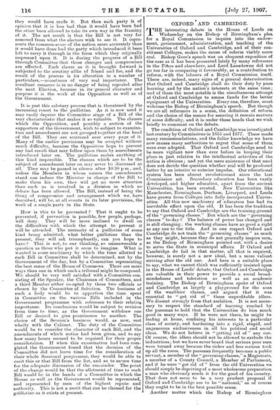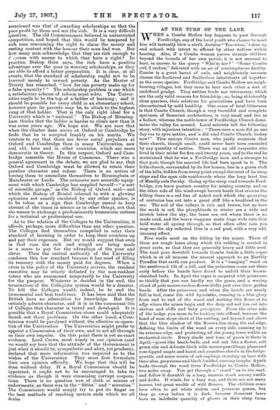OXFORD • AND CAMBRIDGE.
9111E interesting debate in the House of Lords on -1 Wednesday on the Bishop of Birmingham's plea, for a Royal Commission to inquire into the endow-; ment, government, administration, and teaching of the Universities of Oxford and Cambridge, and of their con- stituent Colleges, makes the cause of reform visibly more real. Bishop Gore's speech was an eloquent exposition of the case as it has been presented lately by many reformers in time Tikes and elsewhere, and Lord Lansdowne did not go too far in comparing it favourably, as a contribution to reform, with the labours of a Royal Commission itself. There are, indeed, many signs of a general determination that Oxford and Cambridge shall do their duty by pure learning and by the nation's interests at the same time ; and of these the most notable is the simultaneous attempt at Oxford and Cambridge to amass funds for the better equipment of the -Universities. Every one, therefore, must welcome the Bishop of Birmingham's speech. But though we are all reformers in a sense, time definition of reform and the choice of the means for securing it remain matters of some difficulty, and it is under these heads that we wish briefly to comment on the debate.
The condition of Oxford and Cambridge was investigated last century by Commissions in 1855 and 1877. These made many recommendations, and the fuller knowledge we have now cause's many authorities to regret that some of themn. were ever adopted. That Oxford and Cambridge need to be more vigilant now than ever before in keeping their place in just relation to the intellectual activities of the nation is obvious ; and yet the mere existence of that need does not decide the question whether zeal will be produced better by an interior or exterior impulse. Our educational system has been almost revolutionised since the last Commission sat. Secondary education has been vastly developed, and higher education, apart from the ancient Universities, has been created. New Universities like Manchester, Birmingham, Durham, Liverpool, and Leeds have grown fromn Colleges into fully incorporated Univer- sities. All this new machinery of education has had its inevitable effect upon the old. It has been the tradition to say that Oxford and Cambridge are the training-ground of the "governing classes." But which are time "governing classes" to-day ? The balance of power has changed and is still changing ; the working classes have as geodba right as any one to the title. And in one respect Oxford and Cambridge do not train the "governing classes" as much as they might, because they do not generally inspire men, as the Bishop of Biimingham pointed out, with a desire to serve the State in municipal affairs. If Oxford and Cambridge do fail in that matter, all that is required, however, is surely not a new ideal, but a more valiant striving after the old one. And here is a suitable place to say, what we cannot think was sufficiently insisted upon in the House of Lords' debate, that Oxford and Cambridge are valuable in their power to provide a social broad- mindedness and toleration as well as an academic training. The Bishop of Birmingham spoke of Oxford and Cambridge as largely a playground for the sons of the wealthier classes, and argued that it was essential to " get rid of " these unprofitable idlers. We dissent strongly from that ambition. It is not neces- sary to respect the standard of learning reached. by the passman to hold that the Universities do him much good in many ways. If he were not there, he might be loafing at home, confining his interests to a particular class of society, and hardening into a rigid, stupid, and ungenerous exclusiveness in all his political and social ideas. We do not believe in "getting rid of" any one. Of course, the idlers should not be allowed to exclude the industrious ; but we have never heard that serious poor men were turned away because the richer and less serious took up all the room. The pa,ssman frequently becomes a public servant, a member of the "governing classes," a Magistrate, a member of a County Council, a Member of Parliament., and if he were "got rid of" front the old Universities we should simply be depriving of a most wholesome preparation a man who obviously needs it for the good of his country. That does not seem to be a very prudent proposal if 1Oxford and Cambridge are to be "national," as of course they ought to be in the best possible sense.
• Another matter which the Bishop ' of Birmingham mentioned was that of awarding scholarships so that the poor profit by them and not the rich. It is a very difficult question. The old Commissioners believed in unrestricted competition, and hoped that this would be tempered by rich men renouncing the right to claim the money and resting content with the honour their sons had won. But how Many men acknowledge that they are rich 'enough to d'spense with money to whidh they have a right ? In practice,' Bishop Gore says, the rich have a. positive, advantage over the poor in winning scholarships, as they are able to afford a better preparation. It is clear, at all events, that the Standard of scholarship ought not to be lowered merely to reward poverty. As the Master of Trinity has remarked, "how far can poverty make up for a false quantity ? " The scholarship problem is one which a satisfactory scheme of reform must solve. The Univer- sities 'ought to be the top of a ladder of learning ; and it should be possible for every child in an elementary school, however poor its parents may be, to climb to the highest rung of that ladder. That is the only right ideal for a University which is "national." The Bishop of Birming- ham thinks that the ladder is harder to climb now than it was some years ago. We hope not. We are sure that when the climber does arrive at Oxford or Cambridge he finds that he is accepted frankly on his merits. We venture to say that there are fewer social prejudices at Oxford and Cambridge' than in many Universities, new and old, here and in other countries, which are more democratic in theory. In this respect, Oxford and Cam- bridge resemble the House of Commons. There was a general agreement in the debate, we are glad to say, that Oxford and Cambridge must be allowed to retain their peculiar character and colour. There is no notion of forcing them to assimilate themselves to Birmingham or Manchester or Leeds. The extensive new scientific equip- ment with which Cambridge has supplied herself—" a sort of -scientific garage," as the Bishop of Oxford said—and which the Bishop of Bristol referred to with a glowing optimism not exactly emulated by any other speaker, is to be taken as a sign that Cambridge means' to keep abreast of the times in science as in other things, not that she means to exchange a. predominantly humanistic culture for a technical or professional one.
As to the relation of the Colleges to the Universities, it affords, perhaps, more .difficulties than any other question. The Colleges find themselves compelled to relax their standard of learning in order to , keep their numbers up and pay their expenses. But we would suggest that even in that case the rich and stupid are being made in a sense to pay for the advantage of the poor and clever. Then the central authority of the University condones this low standard because it has need of filling its treasury with the money paid for degrees. When a crisis in the policy of the University arrives, the resident executive may be utterly defeated by the non-resident voters who are sununoned temporarily to the University for the purpose. Whatever is decided in the end, the termination of the Collegiate system would be a disaster. To kill the Colleges would, -indeed, be to end the inunemorial and best traditions. It has been said that the British have no admiration for knowledge. But they certainly admire character, and it is in the communal life of Colleges that character is tested and developed. It is possible that a Royal Commission alone could adequately thresh out these problems. On the other hand, a Com- mission would be paralysed without the effective. co-opera- tion of the Universities. The Universities might prefer to appoint a Commission of. their own, and to act all through on their own impulse. On this, point there is yet no exact evidence. Lord Crewe, most wisely in our opinion (and we would say here that the attitude of the Government is just what it should be, syMpathetic and alert., yet prudent), declared that more information was required as to the wishes of the Universities. They must first formulate their own opinion officially. We hope that this will be done without delay. If a Royal Commilsion should be appointed, it ought not to be encouraged to take its evidence as though it were examining corrupt corpora- tions. There is no question now of sloth or misuse of endowments, as there was in the " fifties " and "seventies." The Commission would simply try to put its finger on the best methods of reaching certain ends which we' all desire







































 Previous page
Previous page